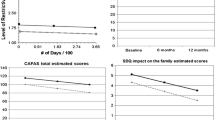Abstract
Case management has emerged as an integral component of current efforts to reform the delivery of mental health services to children and youth with Severe Emotional Disturbance (SED). We examined parental satisfaction with one program's case management system for SED children. In order to validly address parental satisfaction, the program first turned to a group of its parents to develop a satisfaction measure, the Family Satisfaction Survey (FSS). Of the 51 parents who returned an FSS, 74% of the parents were generally satisfied while 26% indicated that they were dissatisfied with their families' case management services. Multivariate regression analyses were employed to examine the role played by client, service, and outcome variables in predicting parental satisfaction. After controlling for child diagnoses, severity of impairment, and levels of psychosocial stress, parent satisfaction with case management services was best predicted by the frequency of monthly contact and fewer days is a psychiatric hospital proportional to length of service. Our results suggest that parent satisfaction is based not only on what case managers do but on how this service impacts SED children's ability to remain at home and in their communities.
Similar content being viewed by others
REFERENCES
Achenbach, T. M., & McConaughy, S. H. (1987). Empirically based assessment of child and adolescent psychopathology: Practical applications. Beverly Hills, CA: Sage.
American Psychiatric Association (1987). Diagnostic and statistical manual of the mental disorders (3rd ed., rev.). Washington, DC: American Psychiatric Association.
Attkisson, C. C., Roberts, R. E., & Pascoe, G. C. (1983). The Evaluation Ranking Scale: Clarification of methodological problems and procedural issues. Evaluation and Program Planning, 6, 349–385.
Barber, C. C., Rosenblatt, A. R., Harris, L. M., & Attkisson, C. C. (1992). Use of mental health services among severely emotionally disturbed children and adolescents in San Francisco. Journal of Child and Family Studies, 1, 183–207.
Chamberlin, R., & Rapp, C. A. (1991). A decade of case management: A methodological review of outcome research. Community Mental Health Journal, 27, 171–188.
Cole, R. F., & Poe, S. L. (1993). Partnership for care: Systems of care for children with serious emotional disturbances and their families. Washington, DC: Washington Business Group on Health.
Evans, M. E., Banks, S. M., Huz, S., & McNulty, T. L. (1994). Initial hospitalization and community tenure outcomes of intensive case management for children and youth with serious emotional disturbances. Journal of Child and Family Studies, 3, 225–234.
Greenley, J. R., & Robitschek, C. G. (1991). Evaluation of a comprehensive program for youth with severe emotional disorders: An analysis of family experiences and satisfaction. American Journal of Orthopsychiatry, 61, 291–297.
Knitzer, J. (1993). Children's mental health policy: Challenging the future. Journal of Emotional and Behavioral Disorders, 1, 8–16.
Lebow, J. L. (1983). Research assessing consumer satisfaction with mental health treatment: A review of findings. Evaluation and Program Planning, 6, 211–236.
Measelle, J. R. (1993). Parents tell it like it is: Evaluating case managed integrated services for children. In S. M. Melnick (Chair), Human services at the frontier: Multifaceted challenges to community-based programs. Symposium presented at the Biennial Conference on Community Research and Action, Williamsburg, Va.
Ruggeri, M. (1994). Patients' and relatives' satisfaction with psychiatric services: The state of the art of its measurement. Social Psychiatry and Psychiatric Epidemiology, 29, 212–227.
Saxe, L., Cross, T., & Silverman, N. (1988). Children's mental health: The gap between what we know and what we do. American Psychologist, 43, 800–807.
Stroul, B., & Friedman, R. M. (1986). A system of care for SED children and youth. Washington, D.C.: CASSP Technical Assistance Center, Georgetown University Child Development.
Surber, R. W. (1994). Clinical case management: A guide to comprehensive treatment of serious mental illness. Thousand Oaks, CA: Sage Publications.
Tuma, J. M. (1989). Mental health services for children: The state of the art. American Psychologist, 44, 188–189.
Williams, B. (1994). Patient satisfaction: A valid concept? Social Science and Medicine, 38, 509–516.
Author information
Authors and Affiliations
Corresponding author
Rights and permissions
About this article
Cite this article
Measelle, J.R., Weinstein, R.S. & Martinez, M. Parent Satisfaction with Case Managed Systems of Care for Children and Youth with Severe Emotional Disturbance. Journal of Child and Family Studies 7, 451–467 (1998). https://doi.org/10.1023/A:1022906010113
Issue Date:
DOI: https://doi.org/10.1023/A:1022906010113



